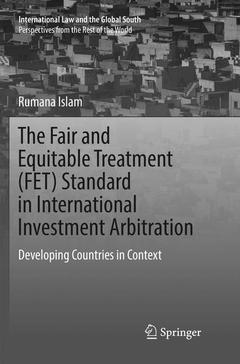Description
The Fair and Equitable Treatment (FET) Standard in International Investment Arbitration, 1st ed. 2018
Developing Countries in Context
International Law and the Global South Series
Language: English
Subject for The Fair and Equitable Treatment (FET) Standard in...:
Publication date: 02-2019
Support: Print on demand
Publication date: 10-2018
Support: Print on demand
Description
/li>Contents
/li>Biography
/li>Comment
/li>
This book presents comprehensive information on a range of issues in connection with the Fair and Equitable Treatment (FET) standard, with a particular focus on arbitral awards against host developing countries, thereby contributing to the available literature in this area of international investment law. It examines in detail the interpretation of the FET standard of key arbitral awards affecting host developing countries, demonstrating the full range of interpretation approaches adopted by the current investment tribunals. At the same time, the book offers valuable practical guidance for counsels/scholars representing host developing countries in investment arbitration, where balancing the competing interests of the foreign investors and the host developing countries in investment disputes poses a complex challenge.
The book puts forward the pressing need for a re-conceptualized interpretation of the FET standard in tune with the developmental issues and challenges faced by host developing countries, recognizing these countries? particular perspectives as an important and relevant aspect of investment disputes (often ignored by the current investment tribunals), while continuing to ensure reasonable protections for foreign investors and therefore serving the needs of the system as whole. The findings presented here will greatly benefit host developing countries engaged in investment arbitration. In addition, the book offers an insightful guide for all researchers whose work involves investment law and investment arbitration issues.
Dr. Rumana Islam is an Associate Professor at the Department of Law, University of Dhaka, Bangladesh. At present she also holds the position of Assistant Director (part-time) of the law research wing of Bangladesh Institute of Law and International Affairs (BILIA). After completing her LLB and LLM degrees from the University of Dhaka, she earned an LLM with a specialization in commercial law from the University of Cambridge (UK) in 2006. She completed her doctoral work at the University of Warwick (UK) with a Commonwealth Scholarship in 2015. Her research interests include international investment law, investment arbitration, commercial arbitration, public international law, banking and securities laws, corporate law and human rights.
Addresses the interpretation of the Fair and Equitable Treatment (FET) standard, particularly in the context of developmental issues and challenges faced by host developing countries
Explores host developing countries’ perspectives in international investment disputes and identifies key problems in interpretations of the FET standard rendered by the current investment tribunals
Investigates whether different classifications of countries adopted by different international organizations are useful in understanding the developmental issues of the host developing countries in an investment dispute context




